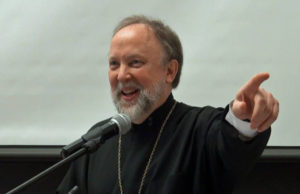On October 26, 2018, Dr. Kyriaki Karidoyanes visited the Sheptytsky Institute and graciously agreed to an interview. In a wide ranging discussion, she spoke about her recent publications, what Orthodoxy can contribute to contemporary human psychology, women deaconesses in the church and on Orthodox women in the church, the 2016 Pan-Orthodox synod in Crete, and the current relationship between the Russian Orthodox Church and Ecumenical Patriarchate.
Dr. Karidoyanes is a theologian, pastoral counselor, licensed psychologist and adjunct professor at Holy Cross Orthodox School of Theology in Brookline, Massachusetts. She is the author of Women Deacons in the Orthodox Church: Called to Holiness and Ministry (Holy Cross Orthodox Press) and editor of Orthodox Women Speak: Discerning “Signs of the Times” (World Council of Churches Publications and Holy Cross Orthodox Press). With her husband, Fr. Thomas FitzGerald, Dean of Theology at Holy Cross, she has co-authored Living Faithfully: The Beatitudes in Everyday Life.
Awarded the Ph.D. degree from the Division of Theological and Religious Studies at Boston University, Dr. FitzGerald has specialized in Orthodox systematic theology both at the School of Theology of the University of Thessaloniki, Greece, where she obtained a Certificate of Advanced Graduate Studies, and at Holy Cross Orthodox School of Theology, where she earned the Master of Divinity degree. In 1994 she was honored as the first woman graduate to receive the Alumni Citation “in recognition of her support of and bringing recognition to Hellenic College-Holy Cross School of Theology.”
Presv. Kyriaki has served as a consultant to the World Council of Churches, where she taught as a visiting professor at the Ecumenical Institute (Geneva, Switzerland) during the 1994-97 academic years and the Institute’s Bossey Seminars 1998 (Athens, Greece).
For fourteen years Dr. FitzGerald served as a commissioner of the Faith and Order Commission of the World Council of Churches, representing the Ecumenical Patriarchate of Constantinople. She is frequently invited to represent the Patriarchate at international ecumenical dialogues and meetings.



